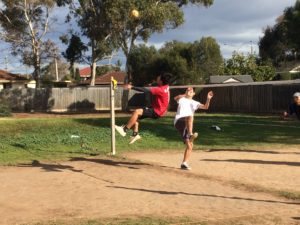Kung Fu soccer arrives in Melbourne
Melbourne is set to get its first Sepak Takraw or ‘Cane Ball’ tournament with the completion of Victoria’s first purpose built court constructed by Hobson’s bay Council at Bruce Comben Reserve.
Also known as Chinlone in its origin country Myanmar, the sport dates back more than 1,500 years, and is hugely popular throughout much of South-East Asia.
Displaying acrobatic feats, players of the sport use only their feet to pass a rattan ball back and forth over a net.
 The sport is slowly growing in popularity in Australia, as migrant and refugee communities import the game. Sometimes it is also called ‘sky ball’ or ‘Kung fu soccer’.
The sport is slowly growing in popularity in Australia, as migrant and refugee communities import the game. Sometimes it is also called ‘sky ball’ or ‘Kung fu soccer’.
Melbourne’s first tournament will begin on September 2 when teams from across Melbourne and others from Bendigo, Mt Gambier and Nhill will compete.
Organiser and AMES Australia Case Manager Thidech Wangwong said 16 teams had so far confirmed their participation in the tournament, each bringing a minimum of five players.
“The new court is fantastic and it will be of benefit to local youth in our area community,” said Thidech, also a leader in Melbourne’s Karen community.
He said that cane ball had been played in parks or back yards but there had been problems with poor surfaces and losing balls over fences.
“We have been consulting with the council and after an ongoing discussion over the last one to two years, this project has become a reality; the first official Sepak Takraw courts built in Melbourne,” Thidech said.
Thidech said the tournaments – until now held in Canberra – gave the participants an opportunity to engage in the sporting activities they love and also to be reunited with their friends and former schoolmates from other parts of the country who they normally only connect with through social media.
“Sport plays a vital roles in every society and especially for refugee communities. In refugee camps young people do not have places or equipment to play the sports they love.”
“So it is very important to create the opportunity where they are able to continue to engage in physical activities and provide the opportunity for them to integrate with mainstream community or society through sport – because in sport, every one speaks the same language,” Thidech said.
Laurie Nowell
AMES Australia Senior Journalist












